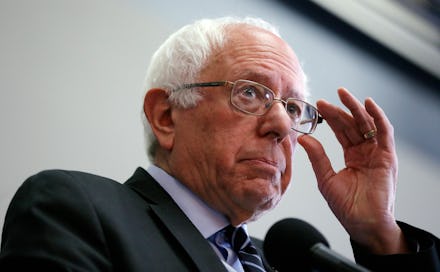Bernie Sanders Is Charming the Most Unlikely Group of Supporters Imaginable

If there's any group of people in America who can claim the title of Bernie Sanders' foremost enemy, it's bankers.
"Let us wage a moral and political war against the billionaires and corporate leaders, on Wall Street and elsewhere," the Vermont senator has raged time and time again over the course of his career. When asked at the first presidential debate which enemy he was most proud of, Sanders cited the financial sector, "I would lump Wall Street and the pharmaceutical industry at the top of my life of people who do not like me."
But it turns out at least some of them want to be his friend.
Odd bedfellows: For a piece in Politico Magazine, Ben Schreckinger dove into Sanders' campaign finance reports to see if he had any supporters in the financial sector. He found that over 100 people in the industry have donated money to the self-described democratic socialist's "political revolution" so far. Most of them work at local branches or smaller firms, but there are about "two dozen who work in high finance in Manhattan," Schreckinger wrote.
Schreckinger interviewed a number of experienced Wall Street bankers whose experience in the industry has left them disenchanted. They support Sanders' proposed reforms of Wall Street — which include breaking up big banks into smaller ones, reinstating the Glass-Steagall Act that once mandated the separation of commercial and investment banking and limiting taxpayer bailouts — given the financial industry's history of recklessness.
The article is laden with colorful quotes that serve as a reminder that no community — not even bankers! — is monolithic or incapable of adopting values beyond their material self-interest.
Paul Ryan, an investment banker who was "horrified" by the no-holds-barred greed of pre-2007 Wall Street, said that he hoped Sanders can make up for President Barack Obama's modest financial regulation reforms:
"If you've actually had a front row seat to this you can see what's going on, and it's not a good trend. Money gets made in the dark, and you can't figure out what's going until there's a massive fuck-up."
Jon Finkel, head trader at the quantitative hedge fund Landscape Capital Management, said there's nothing inconsistent about his commitment to Sanders.
"[Finkel] says he sees no conflict between his day job and his politics. 'There's this idea that somehow there's a disconnect between being in a profession where you're going to be in a high tax bracket, like finance, and social justice ... that's sort of a fallacy.'"
One thing worth noting is that none of these positions — neither those of Sanders nor the bankers — actually constitutes "socialism," which, under the strict definition of theory, would mean nationalizing the banking industry. The reforms being discussed here are about establishing rules that guard against systemic risk and restructuring the financial sector so that even when it fails, it doesn't have the capacity to take the entire economy down with it. There's nothing anti-capitalist, per se, about that.
But compared to his rival Hillary Clinton, Sanders' proposal is indeed radical. Clinton has called for enhancing some regulation of Wall Street, but she has offered little to deal with the reality that there are now even more banking assets concentrated in major Wall Street banks than before the crash. That means they have even more power than before, and can reasonably bank on taxpayers to pick up the pieces again should they induce another economic crisis.
Addressing that structural problem will require some people who are willing to truly buck the status quo — and having some bankers as part of that coalition could help make it more likely to become a reality.